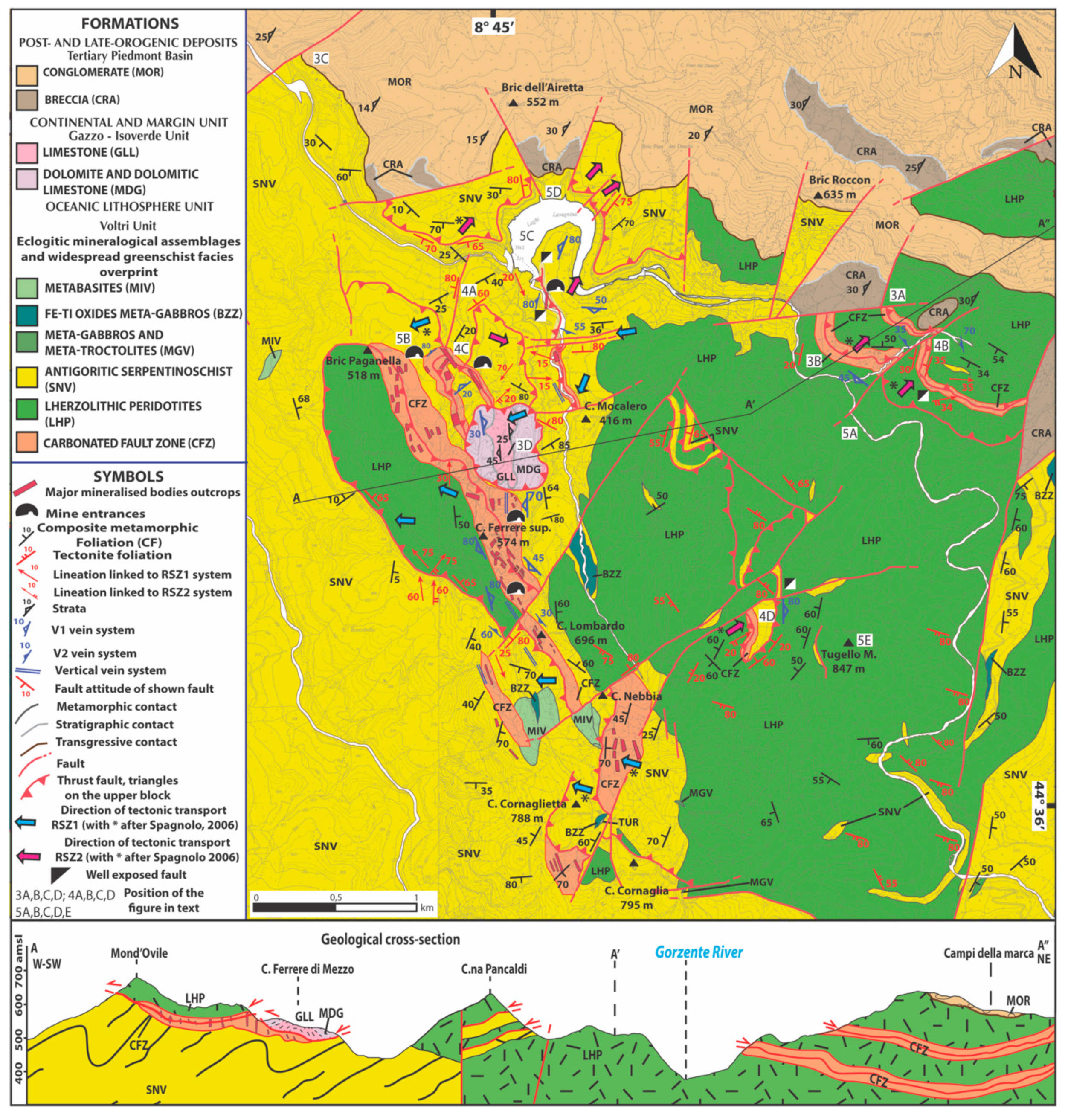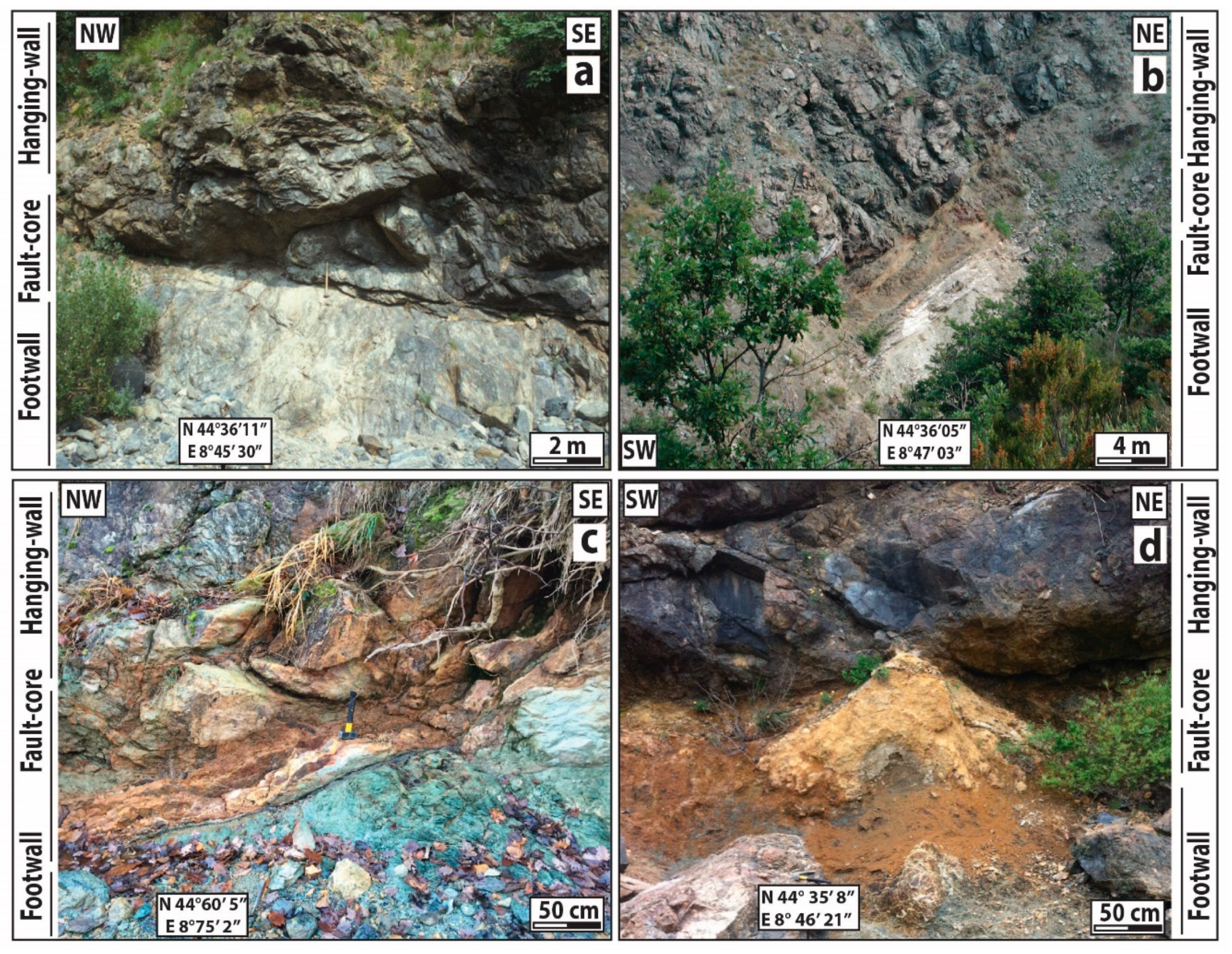Geological Map of a Treasure Chest of Geodiversity: The Lavagnina Lakes Area (Alessandria, Italy)
Abstract
:1. Introduction
2. Geological Background
3. Methods
- the georeferencing of existing geological data about the analyzed area, using the Map Publisher software (WGS84 coordinate system);
- a detailed geological and structural survey on a 1:5000 scale during which the MotionX-GPS IOS app was used to obtain the spatial coordinates of each relevant point, and the base maps used were the Regional Technical Maps (CTRs) of the Regione Piemonte at a 1:10,000 scale. During the fieldwork stage, the CTR of the Regione Piemonte were scaled to obtain a proper working map;
- subsequent integration of all the data acquired during the fieldwork through the Quantum GIS software (WGS84 coordinate system), since GIS permits data elaboration, linking small descriptions of geological heritage, geodiversity, and single geosites to coordinates;
- the production of sketch maps (i.e., a 3D geological model of the Lavagnina Lakes area, see the Geological Map supplementary material) that were obtained from a shaded relief map, based on a digital elevation model (DEM) with 5 m-resolution—the Qgis2threejs plugin was used for DEM and 3D model management.
4. Results
- (i)
- Scientific research: The database, including the position of geological structures and their elevation, paleoseismic structure positions, occurrence of carbonated fault zones and alkaline springs, geomorphological features, and gold mining-related structures could be easily modified and updated according to different kinds of studies.
- (ii)
- Outreach and dissemination activities: With the photos of lithotypes, carbonated fault zones, alkaline springs, and gold mining-related structures that are associated with the GPS points and a brief caption, the database could be used as a starting point for these activities.
- (iii)
- Geotourism: Trail networks and panoramic geo-viewpoints.
4.1. Geodiversity
4.1.1. Lithostratigraphic Succession
- (1)
- the coexistence of the Jurassic Piedmont Ligurian oceanic lithosphere with the original cover of the ophiolitic basement and continental and margin unit;
- (2)
- the complex tectono-metamorphic evolution that affected the lithotypes, with high-pressure metamorphism and variable retrogressive overprints (e.g., blueschist facies conditions for the carbonatic klippe);
- (3)
- the presence of upper Eocene–lower Miocene sedimentary deposits in the Tertiary Piedmont Basin; and
- (4)
- the presence of carbonated ultramafic rocks—an exclusive feature of this area if compared with the whole Voltri Massif.
4.1.2. Exhumed Fault Systems
- (i)
- They are exposed, from 20 to more than 100 m.
- (ii)
- They have developed within lherzolites or serpentinites, or along the lithological contact between serpentinized lherzolites and serpentinites.
- (iii)
- They show complex architectures with plurimeter-thick and asymmetric damage zones, with the development of different fault rocks, and decimeter- to meter-thick fault cores. In particular, the faults shown in Figure 4 are characterized both by structures that, in the literature, are related to paleoseismic events and intense carbonation. These faults show asymmetric damage zones [21,22,23], mirror-like surfaces [24,25], and occurrences of chalcedony with textures related to silica gel deposition [26,27].
4.1.3. Alkaline Springs
4.2. Gold Mining
4.3. Trail Network and Tourism Features
4.4. Biodiversity versus Geodiversity
5. Final Remarks
Supplementary Materials
Author Contributions
Funding
Acknowledgments
Conflicts of Interest
References
- Pipino, G. Oro, Miniere, Storia: Miscellanea di Giacimentologia e Storia Mineraria Italiana; Museo Storico Oro Italiano: Predosa, Italy, 2003. [Google Scholar]
- Piccardo, G.B.; Rampone, E.; Vannucci, R. Upper mantle evolution during continental rifting and ocean formation: Evidences from peridotite bodies of the western Alpine-northern Apennine system. Mémoires Soc. Géol. Fr. 1990, 156, 323–333. [Google Scholar]
- Cimmino, F.; Messiga, B. I calcescisti del Gruppo di Voltri (Liguria Occidentale): Le variazioni composizionali delle miche bianche in rapporto alla evoluzione tettonico-metamorfica alpina. Ofioliti 1979, 4, 269–294. [Google Scholar]
- Scambelluri, M.; Strating, E.H.; Piccardo, G.B.; Vissers, R.L.M.; Rampone, E. Alpine olivine-and titanian clinohumite-bearing assemblages in the Erro-Tobbio peridotite (Voltri Massif, NW Italy). J. Metamorph. Geol. 1991, 9, 79–91. [Google Scholar] [CrossRef]
- Capponi, G.; Crispini, L. Progressive shear deformation in the metasediments of the Voltri Group (Ligurian Alps, Italy); occurrence of structures recording extension parallel to the regional foliation. Boll. Soc. Geol. Ital. 1997, 116, 267–277. [Google Scholar]
- Desmons, J.; Compagnoni, R.; Cortesogno, L.; Frey, M.; Gaggero, L.; Dallagiovanna, G.; Seno, S.; Radelli, L. Alpine metamorphism of the Western Alps: II. High-P/T and related pre-greenschist metamorphism. Schweizer. Mineral. Petrograph. Mitteil. 1999, 79, 111–134. [Google Scholar]
- Federico, L.; Capponi, G.; Crispini, L.; Scambelluri, M. Exhumation of alpine high-pressure rocks: Insights from petrology of eclogite clasts in the Tertiary Piedmontese basin (Ligurian Alps, Italy). Lithos 2004, 74, 21–40. [Google Scholar] [CrossRef]
- Malatesta, C.; Crispini, L.; Federico, L.; Capponi, G.; Scambelluri, M. The exhumation of high pressure ophiolites (Voltri Massif, Western Alps): Insights from structural and petrologic data on metagabbro bodies. Tectonophysics 2012, 568, 102–123. [Google Scholar] [CrossRef]
- Scarsi, M.; Malatesta, C.; Fornasaro, S. Lawsonite-bearing eclogite from a tectonic mélange in the Ligurian Alps: New constraints for the subduction plate-interface evolution. Geol. Mag. 2017, 155, 280–297. [Google Scholar] [CrossRef]
- Capponi, G.; Crispini, L. Structural and metamorphic signature of alpine tectonics in the Voltri Massif (Ligurian Alps, North-Western Italy). Eclogae Geol. Helvetiae 2002, 95, 31–42. [Google Scholar]
- Spagnolo, C.; Crispini, L.; Capponi, G. Late structural evolution in an accretionary wedge: Insights from the Voltri Massif (Ligurian Alps, Italy). Geodinamica Acta 2007, 20, 21–35. [Google Scholar] [CrossRef]
- Capponi, G.; Crispini, L.; Federico, L.; Malatesta, C. Geology of the Eastern Ligurian Alps: A review of the tectonic units. Ital. J. Geosci. 2016, 135, 157–169. [Google Scholar] [CrossRef]
- Capponi, G.; Crispini, L.; Ferrarazzo, I. New field data on the Case Ferrere area (Voltri Massif, Ligurian Alps). Boll. Soc. Geol. Ital. 1998, 117, 87–92. [Google Scholar]
- Spagnolo, C. Late-Orogenic Tectonics in the Eastern Sector of the Ligurian Alps. Ph.D. Thesis, Università degli Studi di Genova, Genova, Italy, 2006. [Google Scholar]
- Federico, L.; Spagnolo, C.; Crispini, L.; Capponi, G. Fault-slip analysis in the metaophiolites of the Voltri Massif: Constraints for the tectonic evolution at the Alps/Apennine boundary. Geol. J. 2009, 44, 225–240. [Google Scholar] [CrossRef]
- Scarsi, M. Faulting, Fluid-Rock Interaction and Hydrothermal Mineralisation in Ultramafic Rocks (Voltri Massif, Ligurian Alps). Ph.D. Thesis, Dipartimento di Scienze della Terra dell’Ambiente e della Vita, University of Genoa, Genova, Italy, 2018. [Google Scholar]
- Pipino, G. Le Valli dell’Oro—Miscellanea di Geologia, Archeologia e Storia dell’Ovadese e della Bassa Val d’Orba. Museo Storico dell’Oro Italiano; Tipografia Pesce: Ovada, Italy, 2001. [Google Scholar]
- Quaranta, F.; Piazza, M.; Vannucci, G. Climatic and tectonic control on the distribution of the Oligocene reefs of the Tertiary Piedmont Basin (NW Italy). J. Geosci. 2009, 128, 587–591. [Google Scholar] [CrossRef]
- Crispini, L.; Federico, L.; Capponi, G.; Spagnolo, C. Late orogenic transpressional tectonics in the “Ligurian Knot”. Boll. Soc. Geol. Ital. 2009, 128, 433–441. [Google Scholar] [CrossRef]
- Capponi, G.; Crispini, L. Note Illustrative della Carta Geologica d’Italia alla scala 1:50.000 Foglio 213 Genova; SELCA: Firenze, Italy, 2008. [Google Scholar]
- Ben-Zion, Y. Dynamic ruptures in recent models of earthquake faults. J. Mech. Phys. Solids 2001, 49, 2209–2244. [Google Scholar] [CrossRef]
- Ben-Zion, Y.; Shi, Z.Q. Dynamic rupture on a material interface with spontaneous generation of plastic strain in the bulk. Earth Planet. Sci. Lett. 2005, 236, 486–496. [Google Scholar] [CrossRef]
- Mitchell, T.M.; Ben-Zion, Y.; Shimamoto, T. Pulverized fault rocks and damage asymmetry along the Arima-Takatsuki Tectonic Line, Japan. Earth Planet. Sci. Lett. 2011, 308, 284–297. [Google Scholar] [CrossRef]
- Evans, J.P.; Prante, M.R.; Janecke, S.U.; Ault, A.K.; Newell, D.L. Hot faults: Iridescent slip surfaces with metallic luster document high-temperature ancient seismicity in the Wasatch fault zone, Utah, USA. Geology 2014, 42, 623–626. [Google Scholar] [CrossRef]
- Rowe, C.D.; Griffith, W.A. Do faults preserve a record of seismic slip: A second opinion. J. Struct. Geol. 2015, 78, 1–26. [Google Scholar] [CrossRef]
- Faber, C.; Rowe, C.D.; Miller, J.A.; Fagereng, Å.; Neethling, J.H. Silica gel in a fault slip surface: Field evidence for palaeo-earthquakes? J. Struct. Geol. 2014, 69, 108–121. [Google Scholar] [CrossRef]
- Prokofiev, V.Y.; Kamenetsky, V.S.; Selektor, S.L.; Rodemann, T.; Kovalenker, V.A.; Vatsadze, S.Z. First direct evidence for natural occurrence of colloidal silica in chalcedony-hosted vacuoles and implications for ore-forming processes. Geology 2017, 45, 71–74. [Google Scholar] [CrossRef]
- Boschi, C.; Dini, A.; Dallai, L.; Ruggieri, G.; Gianelli, G. Enhanced CO2-mineral sequestration by cyclic hydraulic fracturing and Si-rich fluid infiltration into serpentinites at Malentrata (Tuscany, Italy). Chem. Geol. 2009, 265, 209–226. [Google Scholar] [CrossRef]
- Matter, J.M.; Kelemen, P.B. Permanent storage of carbon dioxide in geological reservoirs by mineral carbonation. Nat. Geosci. 2009, 2, 837–841. [Google Scholar] [CrossRef]
- Dockrill, B.; Shipton, Z.K. Structural controls on leakage from a natural CO2 geologic storage site: Central Utah, U.S.A. J. Struct. Geol. 2010, 32, 1768–1782. [Google Scholar] [CrossRef]
- Kelemen, P.B.; Matter, J.; Streit, E.E.; Rudge, J.F.; Curry, W.B.; Blusztajn, J. Rates and Mechanisms of Mineral Carbonation in Peridotite: Natural Processes and Recipes for Enhanced, in situ CO2 Capture and Storage. Ann. Rev. Earth Planet. Sci. 2011, 39, 545–576. [Google Scholar] [CrossRef]
- Seifritz, W. CO2 disposal by means of silicates. Nature 1990, 35, 486. [Google Scholar] [CrossRef]
- Schwarzenbach, E.M.; Lang, S.Q.; Frah-Green, G.L.; Lilley, M.D.; Bemasconi, S.M.; Mehay, S. Sources and cycling of carbon in continental, serpentinite-hosted alkaline springs in the Voltri Massif, Italy. Lithos 2013, 177, 226–244. [Google Scholar] [CrossRef]
- Pipino, G. Le manifestazioni aurifere del gruppo di Voltri con particolare riguardo ai giacimenti della Val Gorzente. Ind. Miner. 1976, 27, 452–468. [Google Scholar]
- Pipino, G. Alcune Considerazioni sui Giacimenti delle Ofioliti Liguri; Liguria Mineraria, Museo Storico Oro Italiano: Predosa, Italy, 1978; pp. 97–107. [Google Scholar]
- Pipino, G. Gold in Ligurian Ophiolites (Italy). In Proceedings of the International Ophiolite Symposium, Republic of Cyprus, Ministry of Agriculture and Natural Resources, Geological Survey Department, Lefkosia, Cyprus, 1–8 April 1980; pp. 756–773. [Google Scholar]
- Buisson, G.; Leblanc, M. Gold-bearing listwaenites (carbonatized ultramafic rocks) from ophiolite complexes. In Metallogeny of Basic and Ultrabasic Rocks; Gallagher, J.M., Ixer, R.A., Neary, C.R., Eds.; The Institution of Mining and Metallurgy: London, UK, 1985; pp. 121–131. [Google Scholar]
- Buisson, G.; Leblanc, M. Gold in carbonatized ultramafic rocks from ophiolite complexes. Econ. Geol. 1985, 80, 2028–2029. [Google Scholar] [CrossRef]
- Pipino, G. Liguria Mineraria. Miscellanea di Giacimentologia e Storia Estrattiva; Tipografia Pesce: Ovada, Italy, 2005. [Google Scholar]
- Badini, M.; Fasano, S.G. Resoconto dell’attività di inanellamento degli uccelli a scopo scientifico in Piemonte e Valle d’Aosta. Riv. Piemontese Storia Nat. 2006, 27, 393–427. [Google Scholar]
- Toffoli, R. Le Autostrade del Cielo: Rotte di Migrazione dell’Avifauna Attraverso le Alpi, Le Autostrade del Cielo”–Regione Piemonte–Osservatorio Faunistico; Regione Piemonte: Torino, Italy, 2007. [Google Scholar]
- Marsili, S.; Barberis, G. Note floristiche piemontesi dal Parco di Capanne di Marcarolo (Alessandria). Inform. Bot. Ital. 2012, 1, 121–124. [Google Scholar]
- Carnevale, P.; Fasano, S.G.; Oneto, F.; Puppo, M.; Raineri, V. Biodiversità e pianificazione ambientale nelle aree protette: Elaborazione della Carta della qualità naturalistica. Biol. Ambient. 2016, 30, 3–11. [Google Scholar]





© 2019 by the authors. Licensee MDPI, Basel, Switzerland. This article is an open access article distributed under the terms and conditions of the Creative Commons Attribution (CC BY) license (http://creativecommons.org/licenses/by/4.0/).
Share and Cite
Scarsi, M.; Crispini, L.; Malatesta, C.; Spagnolo, C.; Capponi, G. Geological Map of a Treasure Chest of Geodiversity: The Lavagnina Lakes Area (Alessandria, Italy). Geosciences 2019, 9, 229. https://doi.org/10.3390/geosciences9050229
Scarsi M, Crispini L, Malatesta C, Spagnolo C, Capponi G. Geological Map of a Treasure Chest of Geodiversity: The Lavagnina Lakes Area (Alessandria, Italy). Geosciences. 2019; 9(5):229. https://doi.org/10.3390/geosciences9050229
Chicago/Turabian StyleScarsi, Marco, Laura Crispini, Cristina Malatesta, Chiara Spagnolo, and Giovanni Capponi. 2019. "Geological Map of a Treasure Chest of Geodiversity: The Lavagnina Lakes Area (Alessandria, Italy)" Geosciences 9, no. 5: 229. https://doi.org/10.3390/geosciences9050229
APA StyleScarsi, M., Crispini, L., Malatesta, C., Spagnolo, C., & Capponi, G. (2019). Geological Map of a Treasure Chest of Geodiversity: The Lavagnina Lakes Area (Alessandria, Italy). Geosciences, 9(5), 229. https://doi.org/10.3390/geosciences9050229




